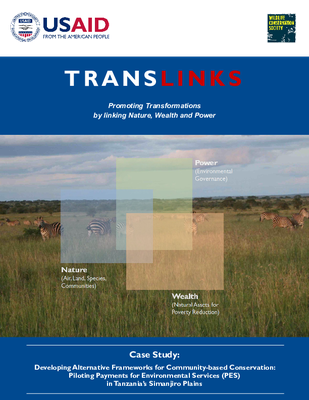Developing Alternative Frameworks for Community-based Conservation: Piloting Payments for Environmental Services (PES) in Tanzania's Simanjiro Plains
Case study on piloting payments for environmental services (PES) in the Simanjiro Plains, Tanzania - The Simanjiro plains provide a key wet season dispersal area for wildebeest and zebra migrating from northern Tanzania’s Tarangire National Park. The plains lie within the boundaries of the lands of three villages occupied by Maasai pastoralists. Wildlife populations have declined substantially over the past two decades, largely as a result of illegal over-hunting and the spread of agricultural land uses in the area. Efforts to enlist local community support for wildlife conservation have, since the 1970s, been undermined by conflicts over land tenure and resource use. In order to address the deteriorating status of wildlife populations and their habitat on the Simanjiro plains, an alternative framework for community-based conservation was developed starting in 2005 through a payments for ecosystem services (PES) agreement. This agreement emerged from the collaboration of local communities with a diverse group of NGOs and private tourism companies,several of which have extensive and long-term experience in the area. The agreement builds on customary pastoralist land use practices to build village-level incentives for wildlife conservation.The agreement has produced an important new framework for community-based conservation in Tanzanian village lands by overcoming existing institutional impediments to community involvement in wildlife conservation through a cost-effective and administratively simple PES structure.
https://biodiversitylinks.org/projects/completed-projects/translinks/translinks-2008/wildlife-conservation-society/ConservationEasementsPES_CaseStudy_TanzaniaSimanjiroPlains_WCS_2008.pdf/view
https://biodiversitylinks.org/projects/completed-projects/translinks/translinks-2008/wildlife-conservation-society/ConservationEasementsPES_CaseStudy_TanzaniaSimanjiroPlains_WCS_2008.pdf/@@download/image/image.png
File
Developing Alternative Frameworks for Community-based Conservation: Piloting Payments for Environmental Services (PES) in Tanzania's Simanjiro Plains
Author(s):
Nelson, Fred
Publication Date: 2008
Location: Simanjiro Plains, Tanzania
DOWNLOAD FILE
Case study on piloting payments for environmental services (PES) in the Simanjiro Plains, Tanzania - The Simanjiro plains provide a key wet season dispersal area for wildebeest and zebra migrating from northern Tanzania’s Tarangire National Park. The plains lie within the boundaries of the lands of three villages occupied by Maasai pastoralists. Wildlife populations have declined substantially over the past two decades, largely as a result of illegal over-hunting and the spread of agricultural land uses in the area. Efforts to enlist local community support for wildlife conservation have, since the 1970s, been undermined by conflicts over land tenure and resource use. In order to address the deteriorating status of wildlife populations and their habitat on the Simanjiro plains, an alternative framework for community-based conservation was developed starting in 2005 through a payments for ecosystem services (PES) agreement. This agreement emerged from the collaboration of local communities with a diverse group of NGOs and private tourism companies,several of which have extensive and long-term experience in the area. The agreement builds on customary pastoralist land use practices to build village-level incentives for wildlife conservation.The agreement has produced an important new framework for community-based conservation in Tanzanian village lands by overcoming existing institutional impediments to community involvement in wildlife conservation through a cost-effective and administratively simple PES structure.



